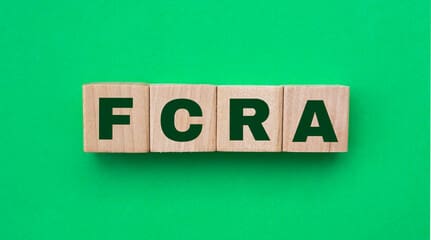
In the past, our federal laws did not protect consumer information. Consumers had no right to know how credit decisions were made. Congress eventually realized that people rely on credit for their daily survival. In 1970, Congress enacted the Fair Credit Reporting Act (FCRA) to regulate how consumer financial information is collected and shared.
Did you know that your credit report plays a key role when you apply for a credit card or loan? The information in your credit history dictates:
If your credit report contains mistakes, your application could be denied. Or you could end up paying thousands of dollars more than necessary. Before the FCRA, consumers had no opportunity to discover or correct credit report errors. Also, the businesses that handled consumer credit information had no responsibility to ensure that data was correct.
The Fair Credit Reporting Act established the first credit reporting rules to protect consumers. Congress appointed the Federal Trade Commission to enforce the FCRA and related regulations are created and enforced by the Consumer Financial Protection Bureau. However, when you find errors in your reports, you can turn to a consumer credit lawyer at Schlanger Law Group to help resolve your problems.
The FCRA gave consumers the right to see their credit reports. The primary goal was to ensure that credit report information is accurate. The FCRA controls businesses and individuals including:
The law also controls the type of information that can be reported. For example, your credit report may contain the following information:
If any information is incorrect, it may affect whether:
The FCRA protects consumers in several important ways. Here is a summary of the FCRA requirements.
This is the primary goal of the Fair Credit Reporting Act. CRAs and the creditors that provide information must create and follow specific procedures. Creditors must provide accurate information to the credit bureaus which then must accurately report the information in the credit report.
If a furnisher shares inaccurate data or information that should be excluded from a credit report, it may violate the FCRA. If the CRA adds inaccurate information to a credit report it may violate the FCRA as well.
In 2003, the Fair and Accurate Credit Transactions Act was added to the FCRA. This is one of the FCRA’s most important consumer protection provisions. As a result, you now have the right to request your credit report every 12 months at no charge. You may also qualify for a free copy under other circumstances.
To request a free copy of your credit reports, go to AnnualCreditReport.com.
Different CRAs may include different information so be sure to request and carefully review all three reports from Equifax, Experian, and TransUnion. If you find any credit report errors, you have the legal right to dispute your credit report history. Since this can be a complicated process, it is important to follow certain steps when you dispute credit report errors.
If you find inaccurate credit report information, notify the CRA. You can also notify the creditor that furnished the data. However, you must file a dispute with the credit bureau to be protected. According to the FCRA:
The FCRA is violated if the CRA or creditor does not investigate your dispute, does not respond within the statutory timeframes, or refuses to correct your credit report. The FCRA can also be violated if your dispute is simply ignored. If your dispute is denied, contact a consumer protection attorney with extensive experience enforcing the Fair Credit Reporting Act.
Identity theft is one of the main causes of credit reporting errors. When someone steals your personal information to open new lines of credit in your name, those accounts will appear on your credit report. If you believe your report contains false information due to identity theft, you have the right to have that information blocked.
You can also ask the CRAs to place a one-year fraud alert in your report. This alert is free and can be extended for an additional seven years in some situations.
Removing identity theft-related information from your credit report is complicated and time-consuming. A dedicated identity theft attorney at Schlanger Law Group can help if you are a victim of ID theft.
In 2018 the Fair Credit Reporting Act added a provision allowing credit freezes on credit reports. For example, if your personal information was exposed during a data breach, you can request a credit freeze. The freeze will prevent new creditors from accessing your information until you remove the freeze. There is no cost to place or lift the freeze. Be sure to ask how long the freeze will remain in place.
You have the right to know if a potential creditor pulls your credit report and makes an adverse decision based on the credit information. An adverse decision could be a credit card company denying your application, a mortgage lender rejecting your loan, or a landlord refusing to lease property to you.
A creditor who makes an adverse decision based on your credit report information must notify you in writing to explain the decision. The creditor must also reveal which credit reporting agency issued the report it used to reach the decision. You then have the right to review that credit report, free of charge.
The FCRA also gives consumers the right to enforce the law. Before the Fair Credit Reporting Act, consumers had no way to ensure accurate and transparent credit reporting.
Now, consumers have the statutory right to request money damages and payment of attorneys’ fees from FCRA violators. You may be entitled to compensation for your actual damages (including out-of-pocket losses) or an amount set by the statute. If you can prove willful misconduct by the CRA or creditor, a court might award punitive damages as well.
Finally, the company that violated the FCRA must also pay the consumer’s attorney’s fees. This means consumers with limited funds can work with a lawyer on a contingency basis to correct their credit report errors.
Your credit report is an important and powerful document. Errors in your credit history can be financially devastating. You may be able to easily resolve some problems by filing a dispute. Or you may face credit reporting agencies and creditors that are lazy, careless, unresponsive, or dishonest.
When inaccurate information in your credit report interferes with your ability to secure credit, affects your interest rates, or otherwise harms you, it’s time to fight back. Battling a massive credit reporting agency, credit card company, or other creditors may be daunting, but you don’t have to face them alone.
The Schlanger Law Group team of Fair Credit Reporting Act lawyers is proud to protect consumers like you every day. Fighting for victims of inaccurate credit reporting is one of our firm’s core practice areas. Call (212) 500-6114 or click the button below to schedule a free, no-obligation case consultation today.
Schlanger Law Group LLP serves clients in New Jersey, New York, and throughout the United States with consumer protection, class action, credit reporting, and identity theft issues.
Schlanger Law Group In The Media




Reach out to Schlanger Law Group for a free consultation, and let’s discuss your case with no upfront fees.
The information on this website is for general information purposes only. Nothing on this site should be taken as legal advice for any individual case or situation.
This information is not intended to create, and receipt or viewing does not constitute, an attorney-client relationship.
ATTORNEY ADVERTISEMENT | Past Results Do Not Guarantee Similar Outcomes in the Future
This site is protected by reCAPTCHA and the Google Privacy Policy and Terms of Service apply.
WEBSITE BY: VISIONTRACTION